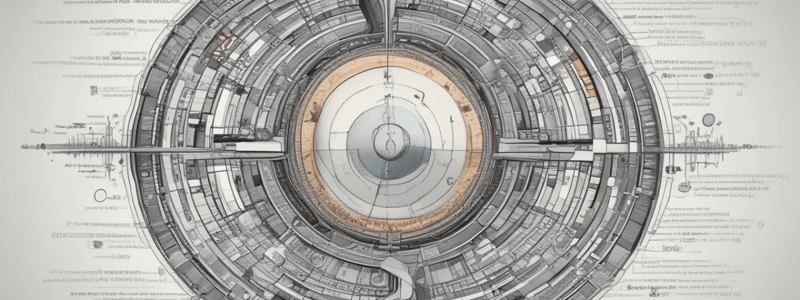Podcast
Questions and Answers
What is the primary goal of scientists, including sociologists, in conducting methodical studies?
What is the primary goal of scientists, including sociologists, in conducting methodical studies?
- To make predictions and generalizations based on empirical research (correct)
- To rely on magic, superstition, or widespread beliefs
- To follow common sense or what 'everyone knows' to be true
- To support or refute widely held beliefs about how society functions
What is a science, according to the first definition?
What is a science, according to the first definition?
- A type of superstition
- A body of organized, verified knowledge (correct)
- A method of study
- A corpus of categorized, validated knowledge
Why is sociology considered a science?
Why is sociology considered a science?
- Because it creates a corpus of categorized, validated knowledge
- Because it employs scientific methods of inquiry
- Because it rejects myth, folklore, and wishful thinking
- All of the above (correct)
What is the primary difference between inductive and deductive reasoning?
What is the primary difference between inductive and deductive reasoning?
What is a theoretical notion in research?
What is a theoretical notion in research?
Why is it important for researchers to detail their methodology?
Why is it important for researchers to detail their methodology?
What is the main difference between common sense and scientific knowledge?
What is the main difference between common sense and scientific knowledge?
What is the primary goal of theory building in research?
What is the primary goal of theory building in research?
What is the role of data in deductive reasoning?
What is the role of data in deductive reasoning?
What is the significance of sociology as a science?
What is the significance of sociology as a science?
What is the foundation of science?
What is the foundation of science?
What is the primary difference between scientific observation and regular observation?
What is the primary difference between scientific observation and regular observation?
What does precision refer to in scientific observation?
What does precision refer to in scientific observation?
Why is scientific observation considered systematic?
Why is scientific observation considered systematic?
What is objectivity in scientific observation?
What is objectivity in scientific observation?
What is the first objective of science?
What is the first objective of science?
What is the goal of generalization in science?
What is the goal of generalization in science?
What is the role of the observer in scientific observation?
What is the role of the observer in scientific observation?
What is a possible explanation for the statistical association between paying taxes and wearing swimsuits?
What is a possible explanation for the statistical association between paying taxes and wearing swimsuits?
Which of the following is an example of a fictitious partnership?
Which of the following is an example of a fictitious partnership?
What is a key characteristic of sociology as a scientific approach?
What is a key characteristic of sociology as a scientific approach?
What is the purpose of peer review and replication in sociology?
What is the purpose of peer review and replication in sociology?
Why do some argue that sociology cannot be a science?
Why do some argue that sociology cannot be a science?
What is the goal of sociological explanations for social phenomena?
What is the goal of sociological explanations for social phenomena?
What is the concept of height related to in everyday life?
What is the concept of height related to in everyday life?
What are the two parts of a concept?
What are the two parts of a concept?
How do we typically acquire definitions of concepts?
How do we typically acquire definitions of concepts?
What happens when we use a concept incorrectly?
What happens when we use a concept incorrectly?
Why are common language concepts often ambiguous and hazy?
Why are common language concepts often ambiguous and hazy?
What is the difference between correlation and causation?
What is the difference between correlation and causation?
What are the three conditions that must be met to prove causality?
What are the three conditions that must be met to prove causality?
What is a bogus relationship between two variables?
What is a bogus relationship between two variables?
What is an example of a bogus relationship between two variables?
What is an example of a bogus relationship between two variables?
What is the main difference between social scientific ideas and common conceptions?
What is the main difference between social scientific ideas and common conceptions?
Flashcards are hidden until you start studying
Study Notes
What is Science?
- Verifiable evidence is the foundation of science, which involves factual observations that can be verified by other observers through measuring, counting, and accuracy checks.
- Scientific observation is different from regular observation in that it is accurate, precise, systematic, and objective, avoiding assumptions and personal biases.
- The goals of science include explaining why something occurs, generalizing to a larger population, and predicting what will happen in the future based on current knowledge.
Theory Building Process
Inductive vs. Deductive
- Inductive process: converting particular data into universal theories, moving from the specific to the general.
- Deductive process: turning general theories into specific hypotheses that can be tested, moving from the general to the specific.
Concepts and Variables
- Concepts are the building blocks of theory, expressed verbally or symbolically, and exist in both natural science and social science.
- Concepts have two parts: a definition and a sign (a word, phrase, or written character).
- Concepts can be learned through experience, examples, and socialization, and can be ambiguous and context-dependent.
Causation vs Correlation
- Sociologists must be careful to distinguish between correlation (where two variables are related) and causation (where a change in one variable causes a change in another).
- To prove causality, three conditions must be met: correlation, temporal order, and control for other variables.
- Apparent associations between variables can be spurious or coincidental, and require careful analysis to establish causality.
Is Sociology a Science?
- Sociology investigates social phenomena using scientific approaches, including empirical observation, data analysis, and theory development.
- Sociology seeks to explain social phenomena using testable and refutable theories, and employs peer review and replication to ensure accuracy and reliability.
- While some argue that sociology cannot be a science due to the complexity and subjectivity of social processes, others contend that sociology can qualify as a science if it follows sound scientific principles and practices.
Studying That Suits You
Use AI to generate personalized quizzes and flashcards to suit your learning preferences.




